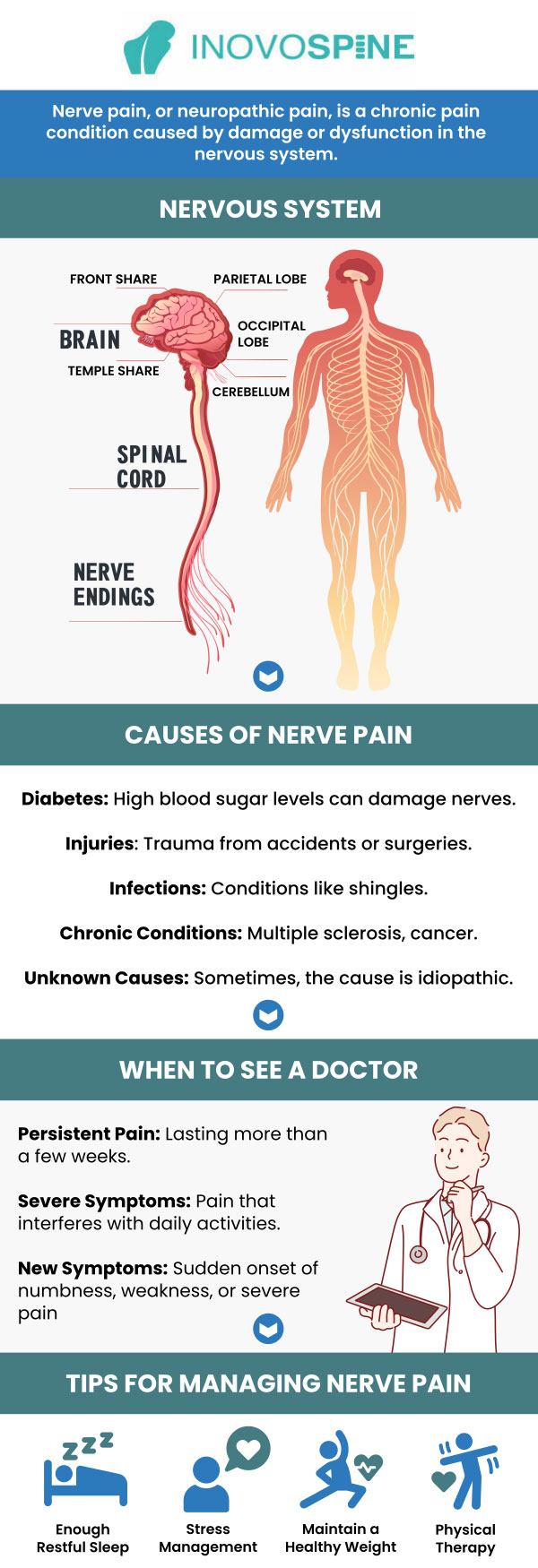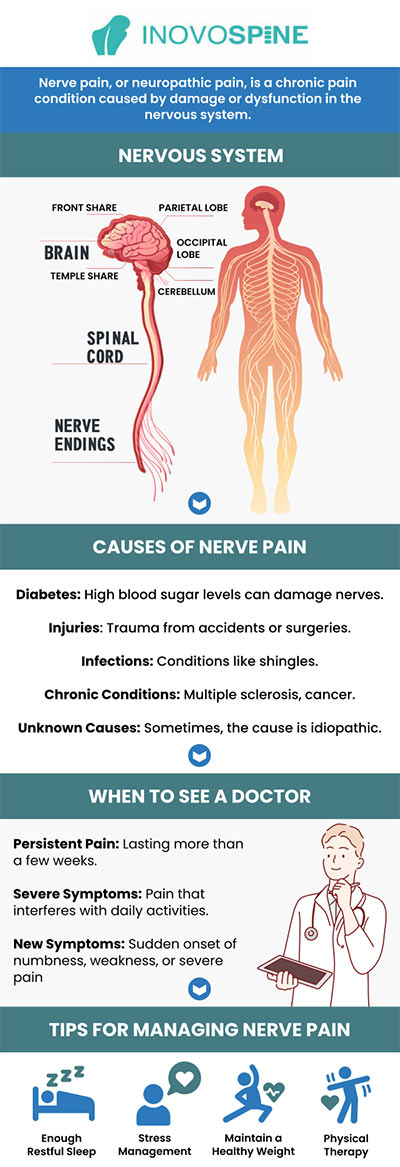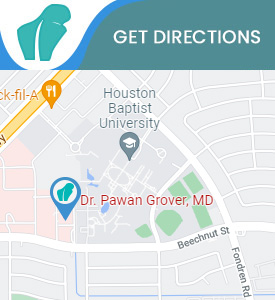Peripheral Nerve Pain Treatment Specialist in Houston, TX
Damage to the peripheral nervous system is the cause of peripheral nerve pain. The nerve system regulates the transmission of information from the brain to the body’s other organs. Interference with messages results from damage to these nerves. The primary symptoms may consist of tingling and numbness in the hands or feet. Affected areas may experience shooting, stabbing, or scorching pain. lack of coordination and balance. Are you or any of your family members suffering from peripheral nerve pain? See Dr. Pawan Grover, MDPA at InovoSpine for treatment. For more information, contact us or book an online appointment. We serve patients from Houston, TX and surrounding areas.




Table of Contents:
Peripheral Nerve Pain Overview
What are the causes of peripheral nerve pain?
What are the symptoms of of peripheral nerve pain?
What causes peripheral neuropathy to flare up?
What does peripheral nerve pain feel like?
How do you diagnose peripheral neuropathy?
What are the warning signs of neuropathy?
How does Dr. Pawan Grover treat peripheral nerve pain?
Peripheral neuropathy is the result of damage to nerves that are outside of the brain and spinal cord. Flare-ups of peripheral neuropathy may cause weakness, pain, or numbness, most often in the hands and feet.
Peripheral nerve pain overview
Peripheral nerve pain stems from damage to the peripheral nervous system. This system of nerves controls the communication from the brain to the rest of the body. Damage to these nerves leads to message interference.
Damage can occur to only one nerve or multiple nerves. The nerves that can be affected are the sensory nerves, motor nerves, and autonomic nerves. These nerves control how the body perceives sensations such as heat or pain, muscle movement, and functions like blood pressure, digestion, and heart rate.
This disorder can be inherited or can occur because of outside factors an individual may encounter.
Possible causes are:
– Injury
– Genetic predisposition
– Diabetes
– Systemic diseases
– Infections
– Trauma
– Vitamin deficiencies
– Diseases
Symptoms of peripheral never pain can appear suddenly or gradual over a period of time. Symptoms vary depending on which nerves are targeted.
Symptoms include:
– Bladder or bowel issues
– Burning pain
– Electric shocking pain
– Lack of coordination
– Muscle weakness
– Numbness in hand or feet
– Tingling in the extremities
There are several reasons that can cause peripheral neuropathy to flare up and some of them can be voided.
If you have a genetic condition that causes neuropathy flare-ups, you can’t avoid this from happening. Another unavoidable reason for these flare-ups is caused by chemotherapy. While there are unavoidable triggers for neuropathy flare-ups, other triggers can be limited or prevented.
Diabetes is a major trigger for peripheral neuropathy. Most people who have diabetes and are managing their blood sugars are doing well at preventing flare-ups. Exercising feet and hands on a regular basis will help prevent the triggers. Use of the right creams and lotions and making sure to eat a healthy diet are also good methods of preventing flare-ups.
Alcohol is a leading factor in causing peripheral neuropathy flare-ups.
Nutrient deficient diets are another trigger of these flare-ups. Nutritious foods will help your body to function properly. A diet that is deficient in vitamin B-12 leaves the nerves less protected than they need to be. A lack of B-12 slows the production of myelin, which is needed to protect the nerves from harm.
Chemicals and toxins can be triggers for peripheral neuropathy flare-ups. Chemicals and toxins can enter the body through many sources. The most common is through ingesting things like narcotics or through the foods that you eat.
Infections can make the body susceptible to peripheral neuropathy.
Peripheral nerve pain can manifest in a number of different ways. It can start with a slow onset of numbness, tingling, or prickling in the hands or feet. You may feel a sharp throbbing pain or a burning sensation. Peripheral nerve pain can cause extreme sensitivity to touch or pain in activities that shouldn’t cause pain. You may feel like you are wearing socks or gloves when you are not. It can also cause muscle weakness, lack of coordination, and falling.
Peripheral neuropathy can be caused by a number of factors. A physical exam will need to be done as part of the diagnosis. The exam may include blood tests, a full medical history, and a neurological examination.
– Blood tests will be done to check for vitamin deficiencies, abnormal immune function, diabetes, and other factors.
– MRI or CT scans may be done to look for damage to disks in the spinal column or other abnormalities.
– Nerve function tests will be done to get an understanding of your nerves’ responses. Other nerve function tests may be done, as well.
Biopsies of the nerves or skin may be done to help make the diagnosis.
Peripheral neuropathy has many signs and symptoms. Here is a list of the most common which will be located in the arms, hands, legs, and feet:
– Pin and needles in extremities
– Burning pain in hands and feet
– Extreme sensitivity to the touch
– Numbness and tingling
– Pain from the pressure of walking
– Weakness in arms and legs
– Difficulty walking
– Unable to grasp with the hands
– Cramping feet
– Pain when twisting the wrists
– Knotted feeling in the palms or soles of the feet.
– Fingers that twist and lock
– Balance problems
– Night pain and difficulty sleeping
– Pain that comes from sheets or covers
– Restless legs and feet
– Hands and feet that feel tired or heavy
Neuropathy pain will seem to be worse at night. This makes it difficult to get the sleep you need and can lead to other problems and increased pain.
Treatment from Dr. Pawan Grover, MDPA, is focused on managing the condition and relieving the symptoms. Medications to relieve the pain can be over-the-counter or prescribed. Anti-seizure medications can sometimes be prescribed to reduce the pain. Some topical treatments can get a modest reduction of pain. Antidepressants are another source of pain relief.
Therapy can be used to help with the pain as well. Transcutaneous electrical nerve stimulation stimulates the nerves to reduce pain. Intravenous immune globulin and plasma exchange can suppress immune activity and reduce inflammation and pain. If necessary, surgery may need to be done to help alleviate the pain. For more information, contact us or schedule an online appointment. We serve patients from Houston TX, Hedwig Village TX, Meadows Place TX, Missouri City TX, Hunters Creek Village TX, Spring Valley Village TX, and surrounding areas.

Additional Service You May Need
- Regenerative Medicine
- Spinal Arthritis
- Diagnostic Mapping
- Interventional Pain
- Minimally Invasive
- Spine Pain
- Radiofrequency Ablation
- Spinal Cord Stimulation
- Physical Rehabilitation
- Facet Joint Pain
- Herniated Discs
- Muscle and Joint Pain
- Post-Laminectomy Pain
- Myofascial Pain
- Peripheral Nerve Pain
- Regional Pain Syndrome









